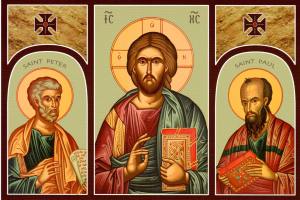A Response to Dr. Cummings’ “Peter and Paul”
 A Response to “Peter and Paul”
A Response to “Peter and Paul”
In his short article—Peter and Paul—Dr. Cummings makes a number of claims in the Macon Telegraph Opinion section I think deserve an adequate response. It is all too common today, that skeptics make assertions without providing adequate evidence; this is a trend that anyone should call into question but, unfortunately, goes unanswered all too often. Let’s evaluate these claims to see if they hold water:
1. Peter and Paul never saw one another.
2. Paul preached Jesus similar to Herakles who “died and rose from the dead.”
3. Paul didn’t want to know Peter and the others in Jerusalem.
4. Peter taught the Jewish Jesus and Paul taught the Christos.
5. There weren’t any churches in Jerusalem; Peter James and John still attended synagogues.
Peter and Paul never saw one another.
First, the claim that Peter and Paul never saw one another is dubious at best. 1 Corinthians, an indisputable Pauline epistle contains an early tradition (vv. 3-5) that historians say was handed Paul (v. 3) within five years of Jesus’ crucifixion. Paul said Christ died for our sins, he was buried, was raised from the dead on the third day, and that he appeared to Cephas (Peter) and the twelve. Moreover, Paul says that he stayed with Peter fifteen days and he was aquatinted (ἱστορέω: to get information from) him. Dr. Cummings himself endorses Paul as the author of Galatians so it is unlikely he will attribute this passage to another.
Paul preached Jesus similar to Herakles who “died and rose from the dead.”
Paul did preach Christ crucified and risen from the dead, but was Paul’s teaching similar to Herakles (Hercules)? It seems here as if Dr. Cummings is attempting to allude to influence from Greek myths onto Paul’s didactic theology, but his point is ambiguous. The parallel Cummings wishes to draw is that Jesus was resurrected from the dead, much like Heracles but this is mistaken. Herakles went to the underworld to defeat Hades, but he did not physically die and physically rise from the dead. This is not a Greek concept. Paul was a Pharisaic Jew and physical resurrection from the dead is a Jewish concept. Thus, Paul isn’t teaching Greek mythology; he was teaching Jewish resurrection. Additionally, those that wish to draw parallels to Christ ascension into heaven need to be more careful; Herakles is an assumption/divinization story known as an apotheosis.
Paul didn’t want to know Peter and the others in Jerusalem.
Third, Paul didn’t want to know Peter and the others in Jerusalem? I honestly do not know where Cummings is getting his information here. I previously noted that Peter and Paul did meet and Paul stayed with Peter about two weeks. Paul mentions Peter, James, and John giving he and Barnabas their right hand of fellowship; it seems doubtful if Paul didn’t want to know Peter, he would mention his endorsement to preach to the Gentiles. Cummings assertion is ad hoc at best.
Peter taught the Jewish Jesus and Paul taught the Christos.
Prima facie, this just looks like pseudo-intellectual posturing. Yes, Peter taught the Jewish Jesus, because Jesus was Jewish; Judaism is the proper background to understand Christ’s teaching. Paul also taught the Christos (Messiah). In 1 Pt. 1:1 Peter addresses his audience as “an apostle of Jesus Christ (Χριστός;Christos). Peter goes on to use this title as a referent to Jesus over twenty times, so the assertion that Peter was preaching something other than the Christos (Messiah) is clearly false.
There weren’t any churches in Jerusalem; Peter James and John still attended synagogues.
Cummings asserts there weren’t any churches (presumably Christian) in Jerusalem. He believes that Peter, James, and John attended synagogues instead. This is a rather moot point. His real point is that this is somehow indicative that Peter, James, and John kept on preaching the Jewish Jesus and not the Christos of Paul, a point already refuted. This really just boils down to semantics. The real reason Cummings brings this up is another attempt to divorce Peter’s teaching from Paul’s. He posits that the Jewish-Jesus teachers lasted until 70 A.D. when the Romans destroyed the temple and that this group was likely dispersed. This is really worse than speculation; Cummings is apparently ignorant of Polycarp who was a disciple of John that had a considerable amount of influence in the early church and is still quoted heavily by theologians to this day. So, contrary to the assertion, the so-called Jewish-Jesus teachers tradition was actually well preserved.
So there we have it, several of the claims of Dr. Cummings turn out to be demonstrably false.’
Excellent rebuttal, Shannon.
I’d love to know more about you.
But you are absolutely right that Paul must have met Peter. Galatians proves this, and it was sloppy on my part to write otherwise.
But I think Galatians also proves the enmity between Paul and Peter; the fact that they “made up” is stated by Paul, but it isn’t very convincing.
Now the two different religions (Paul’s Christos and Peter’s Yeshua) were certainly the case – again as proved by Galatians. When they came together (of course they never did; that’s why we had the Council of Nicaea in 325) is a toss-up. I am not aware the Polycarp disproved this.
But I do want to thank you!
Bill
LikeLike